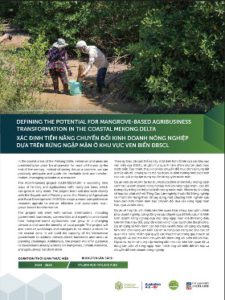The Mekong Delta region in Vietnam is facing several development challenges but the Government of Vietnam (GoV) is committed overcoming these and support the growth of the agricultural sector in the region. The Australian Centre for International Agricultural Research (ACIAR) recently awarded Environment Institute’s Future Making Fellow, Dr Pham Thu Thuy, $471,200 for a project on ‘Defining the potential for mangrove-based agribusiness transformation in the coastal Mekong Delta’.
The Mekong Delta is currently facing significant development challenges including rapid climate change and sea level rise; unsustainable agriculture production; poverty, inequalities and food insecurities; and incomplete legal framework on climate change mitigation and adaptation. These challenges interact such that at least seven of the UN Sustainable Development Goals (SDGs) currently appear impossible to attain in the Delta. There is a need for a significant shift in the understanding, knowledge, skills and capacity of stakeholders at a variety of levels such that they can take a collective approach and drive the significant land use, value chain, governance and social protection transitions that appear to be required if the SDGs are to remain within reach, particularly given rapid climate change.

Project poster developed by ACIAR. This poster was displayed together with other project posters to the Climate Change Ambassador Ms Kristine Tilley, Australian Consul General Sarah Hooper and Mr Duong Tan Phat, Vice Chairman of Can Tho PPC last week. ACIAR currently has 20 projects in Vietnam and our project was selected as one of 6 projects displayed and introduced to the Climate Change Ambassador Ms Kristine Tilley during her last visit to Vietnam
Despite this challenging context, Vietnam holds significant aspirations for agriculture in the Delta. The GoV has set an ambitious national goal to become an upper-middle-income country by 2035 based on balancing economic prosperity with environmental sustainability, promoting equity and social inclusion, and enhancing the capacity and accountability of the state. Agriculture, aquaculture and forestry are currently the three key pillars of the Mekong Delta’s GDP (e.g. accounted for 41% of its GDP in 2011) and are thus the focus of further sustainable, inclusive development in the Delta. The Delta region currently supplies more than 50% of the country’s rice. It also supplies 75% of total Vietnamese shrimp production and up to 70% of annual seafood export values. To achieve its 2035 aspirations, the government of Vietnam plans to restructure and modernise agriculture in Mekong Delta by establishing specialised farming areas for its key agricultural products, and by growing other crops on ineffective rice fields or rotating rice with other crops on the same field. At the same time, Vietnam aspires to significant climate change mitigation nationally, and aims to achieve its goals in the Delta largely through agriculture. Vietnam’s latest Nationally Determined Contribution (NDC) submitted in 2022 also shows a higher commitment on emission reduction targets compared with the previous NDC. The unconditional contribution increased from 9% to 15.8% and the conditional (i.e. what could be done with international development support) contribution increased from 27% to 43.5%.
There is much more to learn about how to realistically reconcile development challenges and aspirations in the context of rapid climate-driven environmental change in the coastal zone of the Mekong Delta. In particular, it is clear there is a need to learn if and how mangroves can play a role not just in coastal land use transitions, but also in Vietnam’s aspirations for modern agri-business transformation in the Delta, including tackling governance challenges and social inequities. Sustainable development of the Mekong Delta must include comprehensive science and integrated policy programs across scales and focus on clearly and commonly defined societal and policy goals by stakeholders, well-informed decisions, capacity building of in-region scientific and policy institutions, effective law enforcement, and adaptable implementation strategies.
Thus, for coastal zone transitions, the needs are:
- gaining a better understanding of the biophysical limits and options for mangroves as climate change progresses and existing mangroves may be under pressure to retreat inland
- exploring the opportunities to derive greater income from ecologically sustainable mangrove-based systems (particularly through ‘polyculture’ or multiple-commodity business models), and
- understanding the potential (from a political economy/ecology perspective) to integrate actions and goals across scales to include farmer and societal goals alongside provincial and national government objectives
Dr Pham Thu Thuy’s project will synthesise current knowledge and foster multi-scale dialogue with government partners in the Mekong region of Vietnam and explore if deliberate land use transition in the coastal zone toward mangrove-based agri-business systems could be realistically progressed as sustainable landuse option. The study will investigate whether such a transition could address not just climate change but other interacting development challenges in the region including improving incomes, and whether a staged decision/transition process like adaptation pathways would be useful. The intent is to clarify realistic future possibilities for the coastal zone of the Delta and provide an opportunity for the GoV to determine how they would like to partner with ACIAR in a larger project in this transition zone.
Grant Information: Defining the potential for mangrove-based agribusiness transformation in the coastal Mekong Delta (Grant number: CLIM/2023/190) with total amount of AUD471,200
Lead Image: Project kick off meeting at Ministry of Agriculture and Rural Development with Environment Institute PI (Pham Thu Thuy), Ministry of Agriculture and Rural Development policy makers (Prof. Tran Quang Bao – Director of Forestry Department and his staff), ACIAR Climate Change Manager (Veronica Doerr), ACIAR Country Manager (Nguyen Thi Thanh An), DFAT expert (Pham Ha).



